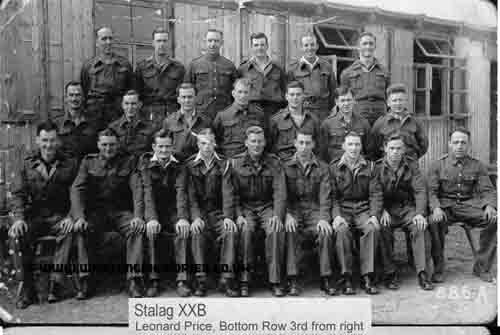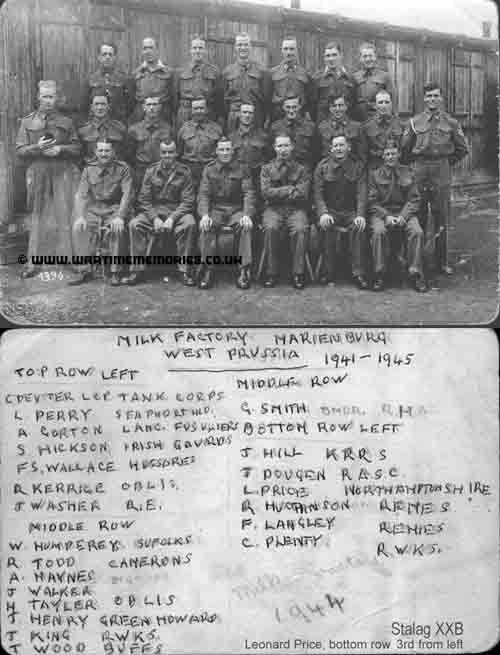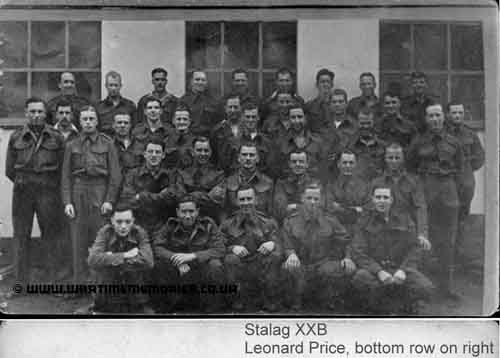The Germans took us prisoner on the 28th of May 1940 at Ypres. One of our number was badly wounded and we had to carry him on a door which was the best stretcher we could find as the Germans had no medical equipment with them. We carried him for three miles through no-man's land past the German front line into their HQ where he was given medical attention. The Germans who captured us told us they had received no food for two days, and took our haversack rations, a tin of corned beef and biscuits.
After spending the night on a stone floor at the German HQ, we were taken with some other prisoners and marched for 10 to 20 miles per day through Belgium. The Belgians tried to bring us food and water but the German guards prevented us from receiving it. We had to live on the small ration the Germans provided - watery soup and one small loaf of bread among five men.
We were marched from dawn to dark, given our ration, and then we were locked in stables, pig sties or barns for the night. On reaching Holland we were packed into cattle trucks, 70 men in each truck, for a four-hour journey, then onto barges for the trip to Germany. A Red Cross boat came alongside, and a woman gave us food, and took names and addresses to notify our families back home (I was shown that same piece of paper when I arrived home five years later.) That meal was my last food for three days.
When we reached Mannheim in Germany we were given a small portion of black bread and a bit of sausage. After four hours we were piled into cattle trucks, with about 70 men crammed like sardines in each truck, and the doors bolted. The only daylight we saw for three days was what came through the ventilator. All our personal belongings had been taken from us, watches, rings, soap, towel and shaving kit. We were tired and dirty and worn out through travelling, marching and lack of food.
After a very trying journey we reached Thorn in Poland at about 3 am, all in a very bad condition and run down. We were issued with two blankets each, and told we would get "coffee" at 6.30 am - it turned out to be made with burnt barley and no milk. Our heads were shaved and our photos were taken, and we were given a number disc to keep with us at all times and show on demand.
I was sent on a small work party to labour on roads for about three weeks, then we were billeted on a farm. We worked for six days per week with Sunday off to wash and mend our clothes. We held our own Church service on the Sunday evening to pray for our loved ones at home.
Christmas 1940 I was sent back to the main camp at Marienburg, and I received my first letter from home, and my first Red Cross parcel. Life was pretty dull in the camp, rise at 6.30 am, get washed and clean our quarters, get our "coffee", and then wait until dinner-time dragged round. We considered ourselves lucky if we could get on a working party away from the camp, as civilians would give us a little extra food if and when the guards weren't watching too closely.
On the 25th of April 1941 I was moved from the big camp with a party of twelve men to work at a dairy. We were worked for 12 hours per day during the week and 18 hours at the weekend. The German guards searched our huts weekly for wireless sets, maps or anything else that might come in useful for escaping. They would pile everything in the middle of the room, pulling all the straw from our palliasses, but we managed to keep our wireless set well hidden under the floor-boards. It took us most of the night to tidy our quarters after these searches.
The Death March 1945
On the 23rd of January 1945 we were told to pack our kits as we were leaving for some unknown destination. I remember the morning very well as it was bitterly cold with about 30° of frost. Our breath froze on the lapels of our coats as we left the town of Marienburg. It was about 3 am and we were marched until dark with only a short break at midday. The only food we had was whatever we had managed to scrounge at the camp and bring with us.
That night we spent in an open field in the snow, with some of the fellows laying their coats on the ground and tried to sleep. In the morning one of the fellows was stiff with cold and frost bitten. We couldn't stir him at first, and had to warm him by rubbing him in the snow, and then running him around the field to get some circulation back into him. It was so bitterly cold that night one of the German guards died.
At daybreak we started marching again, carrying all our belongings with us. I started out with two suit-cases and two blankets. The most trying experience I ever had was the day we marched across an open and unprotected German air-field during a fierce blizzard. It was the middle of this winter, and we had about five miles of open ground to cross. I was wearing army battle-dress, two balaclavas, and had my two blankets wrapped around me. My legs were chapped for a week from the freezing wind.
Another day, during our midday rest after marching all morning, some were having a bite to eat if they had saved any food from the previous day. One of our fellows was a bit slow on getting back in the ranks ready to start marching again, so one of the German guards drew his pistol and shot him. We lost more fellows who died on the way or fell ill and were left behind.
After a time the weather improved, and I began to get fed up with marching with the column, and managed to hang back without being noticed until they were ahead of me. It was about four o'clock in the afternoon so I called at a house and asked for some hot water to make tea. The people there asked me to come in and gave me the best meal I had tasted for a very long while. I continued at my own pace, walking about 15 miles each day, knocking on doors for hot water for tea and a bit of food, staying in whatever shelter I could find for the night.
One night as it was getting dark, I came to a small house, where I asked for hot water to make tea. I was asked to come into the kitchen, where I was given a good meal. They also gave me hot water to wash my feet and legs which by that stage were rather dirty. They also darned my socks and made me stay there for the night. They told me they were evacuees from Hamburg and had lost their home in the bombing. I spent the night on their couch with two blankets and had my first good night's sleep for weeks. These good people also gave me breakfast next morning and I was very sorry to leave them, reluctantly resuming my journey at about ten o'clock.
At the next village I was directed to the school and told to ask for the Burgermeister.
Private Leonard George Price who served in the Northamptonshire Regiment
(Here my father's notes end, with his story incomplete. However, unlike many of his comrades he survived his ordeal was repatriated to England at the end of the war. He met my mother and they married in 1948. In 1951 they emigrated to Australia.)






